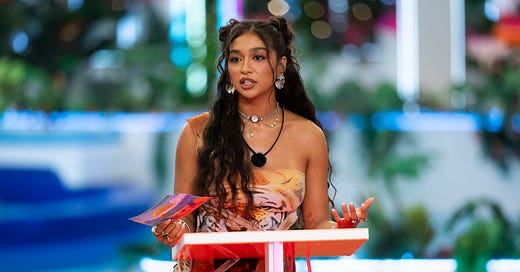If you’re anything like me, with a hidden-not-so-hidden soft spot for reality TV, then you might be catching up every morning with the newest season of Love Island USA (or the evening of, if you have Peacock).
While Love Island USA peaked last year, with an all-stars casting showcasing strong connections — between friends, lovers and enemies — Love Island began a long time ago, airing in the UK in 2015. What many might not know, was that the show based itself of a series with the same name, compromised of an exclusive celebrity cast. Yet, in 2015, it was “members of the public” that graced our TV screens.
Secondary school teachers, nurses, bartenders, sprinkled in with one or two islanders that had once formed liaisons with fame, such as Marcel, a former member of a UK hip hop group who appeared on season three, or Zara, former Miss Great Britain who appeared on season two.
The show’s premise focused on “normal” people finding love without outside deterrents pit up against them. Instead, the “islanders” were faced with recouplings and games to determine whether their bonds might make it til the end. Other than the occasional arguments and odd pairings, I and many other viewers rushed to see the next episodes where islanders were challenged at raising a baby doll together, or issuing pranks on each other. While the dramatics were there, laughter always made its way into each episode.
Yet, the Love Island US season we have in front of our screens shows a sharp contrast. With only two recouplings in four weeks, the islanders have been made to focus on dumping others from the island over growing connections with one another. Recently, five islanders left the same night, breaking off more than one couple.
Attached to the anxiety of loosing a number of cast mates in one night, more than one islander has been privately dumped from the island over online controversy. And while I have no sympathy for anyone using racist slurs, I do have sympathy for the environment it has entrapped those still there.
More than this, the encouragement for viewers to engage in the dumping has encouraged many to sever existing connections for the sake of drama and conflict. With all this, it’s comes to no surprise that most islanders look pale every time they receive a text or see their favourite host, Ariana Madix, who has herself spoken out about sending hate to the islanders before they themselves has the chance to resolve their issues. So has the love island experiment gone too far?
While the series has always had its fair share of unceremonious dumping and strained dynamics, the presence of online discourse has taken things to a whole other dimension. I can’t help but ask myself: Am I watching people try to find love in the midst of cameras and mandatory makeup sessions or am I watching people being torn apart online, with only a few games and decisions from America to provide a snippet of the backlash they are to expect once leaving the island?
While I’m sure there’s much to say about how this season feels different for the lack of genuine couples, I’m just as sure that the decisions to break off connections by public votes (whether purposeful or not) has ruptured any chance for genuine couples. Day after day, islanders are faced with a nauseating amount of uncertainty, as they are to gage their decisions based on not only those around them, but those watching them.
With no possibility of responding or defending themselves, they can only hope that their scenes of reconciliation and mending will be entertaining enough to be showcased to the public. The cameras that surround them offering their only possibility to free themselves from the online hate being spread on every platform.
Although this season has proved the power of the public, in having removed two contestants for acts of racism on their social media, I can’t help but wonder if this season has also proved the danger of the public.
No longer a contribution, voters have become the game makers, overseeing every connection and targeting every islander. So, with IMDb describing Black Mirror as “a series that examines our society's relationship with the media and how it allows us to both shape our own identity and imprison us in a space”, I can’t help but ask myself: Am I watching Love Island or Black Mirror?
What would you say?
Love,
Anastasia






Comparing this with Black Mirror isn't far fetch. I've never watched Love Island, but between other reality TV series that are based on love there are some aspects that I can see becoming an episode of Black Mirror. Love is Blind I feel is one of them, especially when you have the participants forming relationships with just a voice.
hiii ! as someone who hasn’t seen love island, it’s very interesting to hear your take; amidst the internet commenting on the elements within the show, you analyze those beyond it, and how online engagement coincides with the actual happenings. very thought provoking!